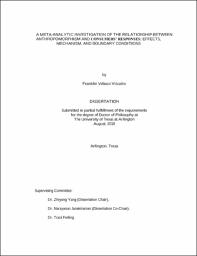
ATTENTION: The works hosted here are being migrated to a new repository that will consolidate resources, improve discoverability, and better show UTA's research impact on the global community. We will update authors as the migration progresses. Please see MavMatrix for more information.
Show simple item record
| dc.contributor.advisor | Yang, Zhiyong | |
| dc.contributor.advisor | Janakiraman, Narayanan | |
| dc.creator | Velasco, Franklin G | |
| dc.date.accessioned | 2019-08-29T21:04:58Z | |
| dc.date.available | 2019-08-29T21:04:58Z | |
| dc.date.created | 2018-08 | |
| dc.date.issued | 2018-08-08 | |
| dc.date.submitted | August 2018 | |
| dc.identifier.uri | http://hdl.handle.net/10106/28658 | |
| dc.description.abstract | Almost one in three brands sold to adults and more than five in six brands sold to children use some form of anthropomorphic representation in promoting their products. Marketers probably hold an inherent belief that anthropomorphism increases consumer preference for their products. Extant research, however, offers no clear evidence to support this. Such mixed findings suggest that this is a prolific and complex problem that could benefit from a synthesis of research on the topic. In response to this call, this dissertation presents two essays applying the meta-analytic approach to understand where the inconsistency comes from and to identify the boundary conditions for the anthropomorphism effects.
Essay 1 focuses on how anthropomorphism affects brand evaluations. In a meta-analysis and two follow-up laboratory experiments, we show that anthropomorphism in general has a positive effect on brand attitude. The key mechanism is self-brand connection. Because of the self-brand connection account, brand familiarity, experience (vs. search) products, and high (vs. low) symbolic products enhance the impact of anthropomorphism on brand evaluations.
Essay 2 investigates the effects of anthropomorphism on individuals’ acts of social goodwill. We show that anthropomorphism generally has a positive influence on individuals’ tendency to engage in acts of social goodwill. Affective thinking is the key process underlying these effects. We further show that Femininity (vs. Masculinity) mindset enhances the persuasive appeal of anthropomorphism when marketing social causes.
Overall results indicate that anthropomorphism does not work effectively for all type of products. The effect of anthropomorphism in persuading consumers’ responses is stronger for familiar brands, experience products, high symbolic products, and for public goods (e.g., pro-environmental behavior, and pro social behavior) compared to the anthropomorphism effect on search products, low symbolic products, and unfamiliar brand products. Implications for both, marketing theory and marketing practitioners, are discussed. | |
| dc.format.mimetype | application/pdf | |
| dc.language.iso | en_US | |
| dc.subject | Anthropomorphism | |
| dc.subject | Brand evaluations | |
| dc.subject | Acts of social goodwill | |
| dc.subject | Branding strategy | |
| dc.title | A META-ANALYTIC INVESTIGATION OF THE RELATIONSHIP BETWEEN ANTHROPOMORPHISM AND CONSUMERS’ RESPONSES: EFFECTS, MECHANISM, AND BOUNDARY CONDITIONS | |
| dc.type | Thesis | |
| dc.degree.department | Marketing | |
| dc.degree.name | Doctor of Philosophy in Marketing | |
| dc.date.updated | 2019-08-29T21:04:59Z | |
| thesis.degree.department | Marketing | |
| thesis.degree.grantor | The University of Texas at Arlington | |
| thesis.degree.level | Doctoral | |
| thesis.degree.name | Doctor of Philosophy in Marketing | |
| dc.type.material | text | |
| dc.creator.orcid | 0000-0002-6561-6741 | |
Files in this item
- Name:
- VELASCO-DISSERTATION-2018.pdf
- Size:
- 2.171Mb
- Format:
- PDF
This item appears in the following Collection(s)
Show simple item record


